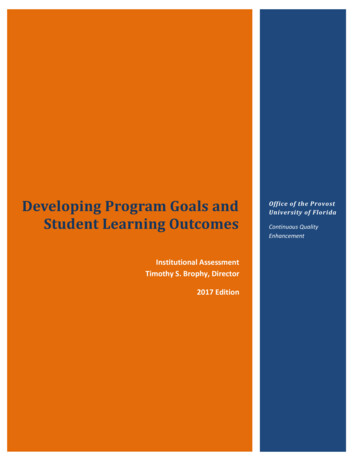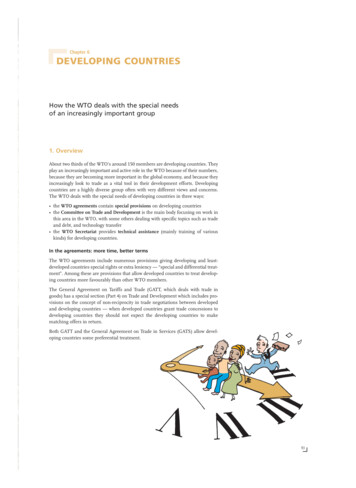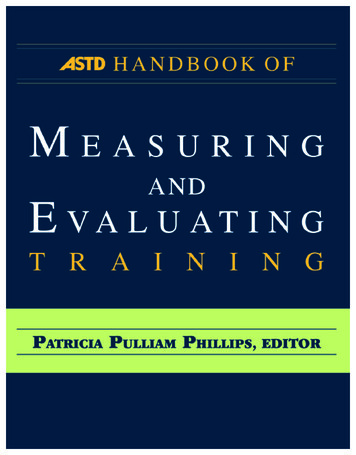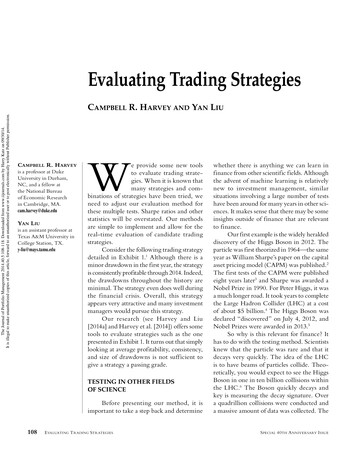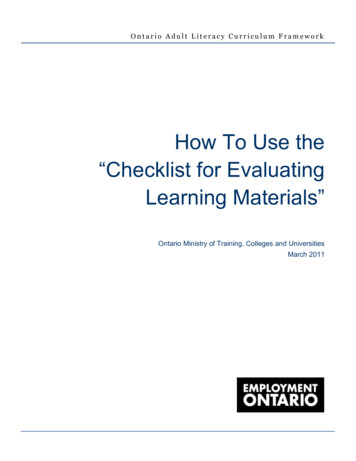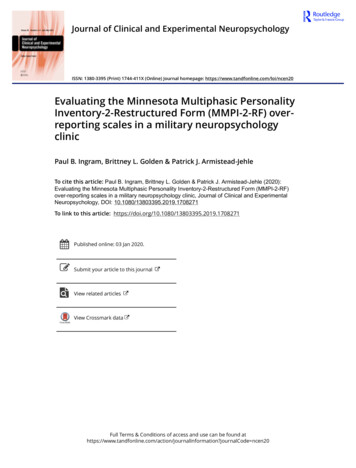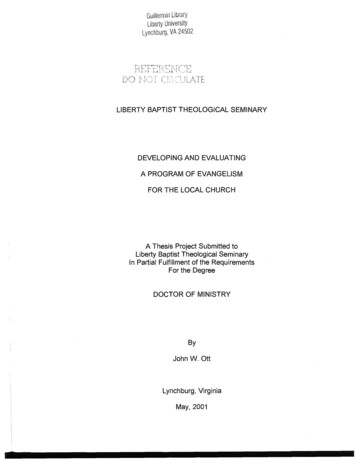
Transcription
Guilierrnin LibraryLiberty UniversityLynchburg, VA 24502LIBERTY BAPTIST THEOLOGICAL SEMINARYDEVELOPING AND EVALUATINGA PROGRAM OF EVANGELISMFOR THE LOCAL CHURCHA Thesis Project Submitted toUberty Baptist Theological SeminaryIn Partial Fulfillment of the RequirementsFor the DegreeDOCTOR OF MINISTRYByJohn W. OttLynchburg, VirginiaMay, 2001
UBERTY BAPTIST THEOLOGICAL SEMINARYTHESIS PROJECT APPROVAL PAGEGRADEii.7.
ABSTRACTDEVELOPING AND EVALUATING A PROGRAM OF EVANGELISMFORTHELOCALCHURCHJohn W. OttLiberty Baptist Theological Seminary, 2001Mentor:The purpose of this project is to develop and test a training program and atraining manual that would effectively mobilize a large local church congregationfor personal evangelism. To accomplish this, the thesis will strive to establish themission of evangelism and how it relates to the problems facing the local churchin this vital area of responsibility. Out of this mission, the thesis will identify anddiscuss some common misconceptions of evangelism. It will also set forth thebiblical mandate of evangelism and research the New Testament model ofevangelism both in the life of Christ and in the life of the First Century Church.Once the theological and biblical bases are established, this thesis will deal withthe actual methodology of evangelism by recording the process of the strategyused for the program, how it started, and how the training procedures weredeveloped. Finally, the thesis will record and tabulate the data and measure theiii
-results of how many were trained, the percentage of those actively sharing theirfaith on a weekly basis compared to the total membership of the church, and ifthere were any increases in the number of conversions during the years thetraining was in place.iv
TABLE OF CONTENTSAPPROVAL PAGE . , . '" . '" . '" . , iiABSTRACT . iiiPageChapter1. THE MISSION OF EVANGELISM . 1STATEMENT OF THE PROBLEM . '" . '" '" . '" '" . 2STATEMENT OF THE PURPOSE . '" . '" . '" . 7STATEMENT OF THE LIMITATIONS . '" '" . '" '" . 7STATEMENT OF METHODOLOGY . 92. THE MISCONCEPTIONS, THE MANDATE, AND THEMODEL OF EVANGELISM . 12THE MISCONCEPTIONS OF EVANGELISM '" '" . '" . '" '"12THE MANDATE FOR EVANGELISM . '" '" . '" . 17THE MODEL FOR EVANGELISM . '" . '" '" . , . '" '" . 203. THE METHODOLOGY OF EVANGELISM . 32DEVELOPING THE PATTERN OF STRATEGY . '" . , '" '"32REPRODUCING REPRODUCERS . 42GOING ON WHEN THE GLORY'S GONE . , '" '" ., . '" . '" . 52DEVELOPING THE PLAN OF GOSPEL PRESENTATION . .63DEVELOPING A LEADER'S GUIDE . , . '" '" '" . '" '" . 674. THE MEASURE OF EVANGELISM . ;. 68MEASURING THE NUMBER TRAINED . 69MEASURING THE EFFECTIVENESS OF THE TRAINING . 73v
MEASURING THE NUMBER OF SALVATION DECISIONS . '" '" . 77MEASURING THE EFFECTIVENESS OF CHURCH GROWTH. .79MEASURING THE TRANSFERABILITY OF THE PROGRAM . 845. SUMMARY AND OVERViEW . 88FINAL WORDS OF APPLICATION AND OBSERVATION . '" . '" 98APPENDIX . 1011. STUDENT STUDY MANUAL (7 LESSONS) . 1022. LEADERS GUIDE FOR LESSONS . '" . '" . 1693. NEW LIFE EVANGELISM COURSE SYLLABUS '" . '" . 2104. SEMESTER SCHEDULE '" . ,. , . '" '" . '" . 2125. LESSON SHEETS . 2136. PRESENTATION OUTLINES . '" . '" '" . , . '" . , . 2247. WRITTEN EXAMINATION . 2308. ILLUSTRATION SHEETS . '" . 2389. CERTIFICATE OF TRAINING . '" '" . '" . '" . '" . 23910. RESOURCES FOR PRAYER BREAKFAST . '" . '" . 24011. CHURCH RESPONSES TO NEW LIFE EVANGELISM WEEKENDSURVEY . 242BIBLIOGRAPHY . 275VITA . .vi.----------------.7
CHAPTER 1THE MISSION OF EVANGELISMWhich is the most important, to train a soul winner or to win a soul? Atfirst glance it might be tempting to say win a soul. After all, to train a soul winnermight be a noble and spiritual endeavor, but no one has been saved from theclutches of hell, from the burning flames of an eternity without God. All that hasbeen done is to help an existing saint get a little bit further down the road in hisspiritual journey.However, by stepping back and taking a little bit broader view, and with aproper understanding of how to train a soul winner, a different conclusion mightbe reached. It is possible to win a hundred people to Christ without training onesoul winner. It is impossible to train one soul winner without ultimately winning ahundred people to Christ if he is trained correctly. Not only will people bereached for Christ during his training, but all the people he will lead to Christ forthe rest of his life will be reached. When people are being won for Christ, theKingdom is being added to. When people are being trained to win people toChrist, then the Kingdom is being multiplied.The position of this thesis is that personal one-on-one evangelism is by farthe most effective way to lead somebody to Christ. Even though mass1
2evangelism touches many people with the gospel in a very short period of time,relatively few who initially respond to the invitation ultimately end up discipledand assimilated into the body life of a local congregation.STATEMENT OF THE PROBLEMAccording to Donald A. McGavran local webs are the most effective wayto bring someone to a saving knowledge of Christ where he is discipled andnurtured into the Body of Christ. When a friend shares his faith with him andbrings him to church himself, not only is he more likely to respond to the gospelbut other members of his family and friends are, too.In every rancho in Mexico, barrio in the Philippines, gaon inIndia, or compound in Africa, the ambassador of Christ should seenot simply Mexicans, Filipinos, Indians, or Africans, but webs ofrelationship-that is, organisms composed of individuals closelyand permanently linked together. The evangelist should memorizethe two or three dozen technical words which describe the commonrelationships. He can then learn the names of the yet-to-be-wonrelations in each group of new Christians. He will thus becomeaware of the extensive nature of the web and see the truedimensions of his task. He soon comes to see that faith can flowthrough the lines of relationship which comprise the web-or, notusing these, can be effectively halted. 1Yet, as recent surveys show in the 1998 Journal of the Annual DistrictConference of The Wesleyan Church of Virginia, the percentage of Christianswho actively share their faith is extremely low. Of the 49 Wesleyan churches inVirginia, 35 of them led five or less people to Christ in a one-year span of time.1 Donald A. McGavran, Understanding Church Growth, William B.Eerdman Publishing Co., Grand Rapids, MI, 1980, 360
3Twenty-six of the 49 churches with a combined congregation of 1,171 people ledless than 30 people to Christ in one year. Ten of the 49 churches, with acombined congregation of 361 people, failed to lead anyone to Christ in a wholeyear. 2In fact, of the 1,690 Wesleyan churches in America, according to a recentstudy conducted by Dr. Marlin Mull, the General Director of Evangelism andChurch Growth for the Wesleyan Denomination in Indianapolis, IN, 272Wesleyan churches across the nation failed to lead one person to Christ this pastyear. That means over 16% of all Wesleyan churches in America failed to leadone person to Christ in one year. 3According to a study done by Dr. Keith Drury, General Director of LocalChurch Education for the Wesleyan Church in Indianapolis, IN, if we stopped allthe births and deaths in our country and evangelized at last year's pace, it wouldtake 320 years to evangelize America. According to him, if you stopped all thebirths and deaths in the world and continued at our present rate of evangelism, itwould take 4,000 years to evangelize the world. There are 325,000 births eachday, minus 15,000 starvation deaths, minus 120,000 other deaths, meaning thenet population growth for one day equals 190,000 unsaved souls. In the spaceof one week, there will be 1,000,000 more people in the world than there aretoday. There are nine times as many lost people in the world today as when2 1998 Journal of the Annual District Conference of The Wesleyan Churchof Virginia.3 Statistical Report of The Wesleyan Church, 1999 Statistics.
4Jesus gave the Great Commission. If a local church were built to seat 100,000people and began busing in a new group of lost people to hear the gospel everynight, it would take 82 years to preach the gospel once to those who have notheard. But, by then there would be another 2,500,000,000 alive. 4According to Dr. Drury, our population growth is at 2.6 babies per second,10,300 per hour, 93,000,000 this year. It took from creation to 1850, a period ofat least 6,000 years, for the world to reach the one billion population mark. Ittook from 1850 to 1930, a period of 70 years, for the world to reach its secondbillion. It took from 1930 to 1975, a period of 45 years, for the world to reach itsfourth billion. It took from 1975 to 1985, a period of 10 years, for the world toreach its fifth billion. It took from 1985 to 1999, a period of 14 years, for the worldto reach its sixth billion. Over half of all the people who ever lived are alivetoday.5 According to Dr. Bill Bright, founder of Campus Crusade for Christ, ittakes a church of 1,000 people, plus five full-time pastors on staff, 365 days towin one person to Christ. 6In fact, if a seeker were to ask how to know for sure he had eternal life, avast majority of Christians would not even know where to take him in scripture,4 Keith Drury, "Leadership and Personal Soulwinning" (lecture given at aCatalyst Meeting for Youth Leaders at Lakeview Wesleyan Church on October18, 1986).5lbid.6Ibid.
5according to George Barna Research as reported in the Spring 2000 issue ofMandate Magazine.9 out of 10 American adults (86%) cannot accurately define themeaning of the "Great Commission." 7 out of 10 adults have no clue what "John 3:16" means. Barely one third of all adults (31 %) know the meaning of theexpression "the gospeL" Only 4% of adults could define the "Great Commission," quoteJohn 3:16, and define "the gospeL"CD58% of born again Christians claim they have shared their faithwith a non-Christian during the past year. (1999)CDBusters (those 18-33 years of age) are more likely than anyother generation to share their faith with others. Our data showthat 66% of Busters shared their faith in the last year, comparedto 58% of Boomers (those 34-52 years of age), 52% of Builders(those 53-71), and 41% of Seniors (those 72 years). (1999)CDBlacks (76%) are much more likely than whites (52%) to reportthat they have shared their faith with someone in the past year.(1999)CDProtestant non-mainline attenders and Baptists are more likelythan average to share their faith. Specifically, 66% of Protestantnon-mainline attenders and 64% of Baptists report that theyhave shared their faith with a non-Christian in the past year,compared to 48% of mainline attenders and 43 of Catholics.(1999)It is surprising to see that not all of those who share their faith aretotally committed to the Christian faith. When evangelizers wereasked about their commitment to the Christian faith, only 76% saidthey were absolutely committed to their faith, leaving nearly 1 out of4 evangelizers sharing about a faith that, in reality, they are nottotally committed to. (1999) 51 % of Blacks strongly agree they "personally have aresponsibility to tell other people about their religious beliefs,"versus 29% of the total American population. (1999) Americans living in the South feel more of a responsibility toshare their faith with others than do adults in other regions ofthe country, with 40% of southerners feeling a sense ofresponsibility to share their faith with others, compared to 25%of those living in the West or Midwest, and 23% of those living inthe Northeast. (1999) Only about half (53%) of born again Christians feel a sense ofresponsibility to tell others about their faith. In other words,nearly half of born again Christians do not think that it is their
6 responsibility to share their religious beliefs with those who donot know Christ. (1999)Overall, Catholics are less likely than any other denominationalgroup to feel a responsibility to share their faith with others.Only 14% of Catholics report that they have a personalresponsibility to tell others about their beliefs, compared to 27%of mainline attenders, 48% of Protestant non-mainlineattenders, and 52% of Baptists. (1999fThis author accepted Christ at a very young age, third or fourth grade. Hegrew up in a very strong Christian family and a very strong Christian church. Hewas able to resist a lot of the pitfalls his friends were falling into. He never gotinto smoking, drinking, using drugs, or sex. Most everyone knew he was aChristian, but they never knew why. And he never told them why because hewas too unsure of himself. He lacked the confidence. The first time hepurposely sat down to share Christ with someone was as a youth pastor with ateen named Sam Ramirez in his first youth group. He was out of college, hadearned his degree. He had been in full time Christian ministry for almost a yearbefore he built up enough courage to share his faith one-on-one. Within just afew short months, he had led 25-30 teens and adults to Christ. He was soexcited. Every Sunday someone was making a public commitment to Christ atthe altar.People want to share their faith more effectively than they have in thepast. Many of them feel guilt because of their lack of witness in their life.7 George Barna Research, "National Statistics: Barna Research,"Mandate, Spring 2000, 10
7However, for many of them, all they have had for most of their adult life werepastors who stood behind protective pulpits and told them they should go, butnever once showed them how to go. It's one thing to rant and rave and yell thatpeople are going to hell if someone doesn't go and tell them. It's another thing tostep out into the street, take some laymen along and show them how to leadsomeone to Jesus.STATEMENT OF THE PURPOSEThe purpose of this paper is to demonstrate how a pastor can positivelyand effectively train, equip and mobilize an entire church for evangelism, and toshow a pastor how he can get his laymen out of the pew and onto the pavement.This project will reveal that laymen are not only willing, but also eager to sharetheir faith when they are shown how to do it tactfully and effectively.STATEMENT OF LIMITATIONSThe reader should know and understand at the start of this thesis that thisproject is confined to the process of training people how to become effective soulwinners. It does not attempt to adequately handle the whole issue of discipleshipor follow-up of new believers beyond the first week of their new life in Christ.That's not to say that discipleship is not critically important. It simply means thatthis thesis deals with the process of training future soul winners to share theirfaith on a personal one-on-one basis.
8Some key terms that will be used to help describe the purpose of thisproject and the process the author went through to fulfill that purpose are asfollows:1. Soul Winner: Anyone who knows Christ personally and hasdemonstrated a consistent ability to share that knowledge with othersin such an intimate personal encounter as to lead individuals to asaving knowledge of Christ themselves.2. Trainer: Someone who has effectively completed the courses, fulfilledthe requirements, and demonstrated such a proficiency in sharing hisfaith that he is able to train others to become personal soul winners.3. Trainee: Someone who is going through the course for the first timeand has little experience in sharing his faith effectively.4. Assistant Trainer: Someone who has effectively completed the courseand fulfilled the requirements but does not yet possess the confidenceand/or ability to train others to do the same.5. Prospect: Someone who has received a visit from a soul winning teamand is possibly interested in hearing the gospel.6. New Convert: Someone who has received a visit from a soul winningteam and has responded to a gospel presentation by opening up hisheart and life and invited Jesus Christ to come in and save him from allhis sin.
97. Discipler: Someone who knows Christ personally and has beenassigned to a new convert to follow up on him with Bible studies andprayer.8. The Plan: The scriptures, the comments and the questions used withthose scriptures that have been brought together in this thesis projectand organized in such a way as to communicate the gospel clearly andconcisely, making it possible for people to open their hearts to Christ ifthey so desire.9. Evangelized: For the purpose of this paper, the word "evangelized"does not simply mean that someone or a family has heard the gospel.In the context of this thesis, "evangelized" means that a person orhousehold has actually responded to the gospel by opening theirhearts to Jesus Christ and accepting Him as their personal Lord andSavior.10. Out From Under the Bushel is the title of the training manual that theauthor wrote for the class instruction.STATEMENT OF METHODOLOGYThe proposed design for this project on how to effectively mobilize a localcongregation to actively share their faith and lead people to Christ on aconsistent basis will begin with a handful of willing laymen who are passionateand serious about becoming effective soul winners. The first step is to set up aspecific time of training with measurable goals to reach. This training will not
F10only make them effective soul winners, but will take them one step further inmaking them effective trainers of soul winners. It is the purpose of this project toprove that the best way to mobilize" an entire church in personal evangelism is totrain a trainer to train a trainer.In this proposed design, it is critical that a .common soul winning plan bedeveloped that is theologically accurate, effectively communicated and easilylearned. It is also proposed that a study book would be written that breaks theplan down into smaller sections that can make the soul winning plan simple tolearn and easily transferable. The biblical translation used throughout this planwill be the New International Version.In this project the mission of evangelism will be closely examined. Themisconceptions of evangelism will be discussed and the question, "What isevangelism?" will be dealt with. This project will deal with the mandate forevangelism and the models of evangelism, examining the theologicalunderstanding for not only Christ's call to evangelism, but His example ofevangelism in His own personal ministry. This project also takes a close look atthe ways the First Century Church modeled evangelism for their successors.Finally after six years and 12 semesters of training in a local church, this projectwill closely examine the measure of this evangelism training program's success.Some of the measures used will be as follows: (1) How many laymen weretrained and active in sharing their faith, compared to the total membership of thechurch; (2) Did the percentage of active soul winners increase over the six years;(3) How well were the laymen who took the training able to reproduce
pa11reproducers; (4) Did the project in any way increase the number of people findingChrist as their Lord and Savior during those six years compared to the yearsbefore and after; (5) Did this program of training help the local church to grownumerically; and (6) Was this program transferable to other outside churches thatwanted to see their congregations mobilized for evangelism?
F12CHAPTER 2THE MISCONCEPTIONS, THE MANDATEAND THE MODEL OF EVANGELISMTHE MISCONCEPTIONS OF EVANGELISMEvangelism is one of the most misunderstood, misused, and ignoredareas of the church today. It is one of the greatest sources of frustration, guilt,and fear for laymen and pastors alike. What is this thing Christ left for us to dobefore He went to His Father? Why does it leave people feeling like guilt-riddenfailures every time a sermon tells them to go? Why was evangelism so dynamicin the early church, yet seems so absent in churches today? What is evangelismand why do it? There are three common misconceptions about what evangelismis. These are so prevailing that this thesis will strive to address them at theoutset.Misconception #1Evangelism is the active, personal effort of Christians to bring lost andhurting people into the fellowship of the church. Get them to church-as ifchurch is the thing that transforms peoples' lives. There is a need for a vitalministry of inviting and bringing people to church. But there is no room for amentality that allows substituting an invitation to church for an invitation to Christ.Bringing a friend to church no more makes a Christian a witness than taking a
13car to the garage makes him a mechanic. When Andrew met Christ for the firsttime, he ran to find his brother Simon. When Andrew found Simon the Scripturesdon't say, "And he brought him to church." It says, "And he brought him toJesus." Most people know this, and most would agree with the idea. Yet if aChristian is in someone's home, what does he talk about most-church orChrist? Evangelism is not inviting people to church.Misconception #2Evangelism is a concerted effort on the part of the church to show Christto the world through consistent Christian living. When people are invited to learnhow to share their faith, the response is often, "I witness through my life." Sure,a Christian must witness through his life. A Christian must have a consistentwalk that people can look to as an example. Jesus used life-style evangelism inreaching His disciples. They could see and observe Christ in every situation thatarose. However, that was not the total scope of Christ's outreach. Neithershould it be ours. There are two major problems with being a witness through"living the life." First, the only people that can be witnessed to are those who arevery near. That leaves out a lot of people God wants reached. The secondproblem with this kind of life-style evangelism is that it doesn't bear witness toChrist. It bears witness to self. You are the one you witness for when you arewitnessing by your life alone. When people can see your life without a verbalgospel testimony, their conclusion is, "John isa really great guy," or "Susan isone of the nicest gals I've ever met." That reflects well on John, or at the best on
p14John's church. The only problem is, John cannot save their soul. They cannotget to heaven because they know John. "Living the life" is not evangelism.Evangelism is turning peoples' eyes on Jesus Christ, not John's good life.Misconception #3Evangelism is a gift from God to bring people into a saving relationshipwith Jesus Christ. Probably the most common response heard in challengingpeople to evangelism is, "I'm sorry, that's not my gift." Evangelism is not a gift.If it is a gift as some understand it to be, most Christians would be off the hook.Then evangelism would fall on the shoulders of only those few who have thatspiritual gift.This thesis suggests three areas of a Christian's life. There are his fruit,his gifts, and his responsibilities. The fruit of a Christian's life is obviously foundin Galatians 5:22, "But the fruit of the Spirit is love, joy, peace, patience,kindness, goodness, faithfulness, gentleness and self-control. Against suchthings there is no law." We all know and understand the fruit to be singular andnot plural, meaning the fruit of the Spirit has to be taken as a whole, not ninedistinct parts. That means all Christians have all nine characteristics of the fruitworking in their life.The second area of a Christian's life is his gifts of the Spirit. There areseveral places throughout the New Testament where lists of gifts occur. Forexample, Romans 12:6-8:
F15We have different gifts according to the grace given us. If a man'sgift is prophesying let him use it in proportion to his faith. If it isserving let him serve; if it is teaching let him teach; if it isencouraging let him encourage; if it is contributing to the needs ofothers, let him give generously; if it is leadership, let him governdiligently; if it is showing mercy, let him do it cheerfully.Another list occurs in I Corinthians 12:8-11:To one there is given through the Spirit the message of wisdom, toanother the message of knowledge by means of the same Spirit, toanother faith by the same Spirit, to another gifts of healing by thatone Spirit, to another miraculous powers, to another prophecy, toanother the ability to distinguish between spirits, to another theability to speak in different kinds of tongues, and to still another theinterpretation of tongues. All these are the work of one and thesame Spirit, and he gives them to each man, just as he determines.Also in I Corinthians 12:28-31:And in the church God has appointed first of all apostles, secondprophets, third teachers, then workers of miracles also those havinggifts of healing, those able to help others, those with gifts ofadministration, and those speaking in different kinds of tongues.Are all apostles? Are all prophets? Are all teachers? Do all workmiracles? Do all have gifts of healing? Do all speak in tongues?Do all interpret? But eagerly desire the greater gifts.Another list is found in I Peter 4: 10-11:Each one should use whatever gift he has received to serve othersfaithfully administering God's grace in its various forms. If anyonespeaks he should do it as one speaking the very words of God. Ifanyone serves, he should do it with the strength God provides, sothat in all things God may be praised through Jesus Christ. To Himbe the glory and the power forever and ever. Amen.Unlike the fruit of the Spirit, the gifts of the Spirit are many and varied. Ineach of these lists of Spiritual Gifts it is stated clearly that there is no one giftevery Christian has, nor one Christian who has all the gifts. Each Christian hashis own unique gift mix to complement the other gifted Christians in the body.
16Traditionally, this is where evangelism has been placed: as a gift; primarily due toone verse of scripture that has commonly been accepted through the years asanother list of spiritual gifts. Ephesians 4:11-12, "It was he who gave some to beapostles, some to be prophets, some to be evangelists, and some to be pastorsand teachers, to prepare God's people forwork of service, so that the body ofChrist may be built up."Obviously, if evangelism is placed under the heading of spiritual gifts, thenit is relegated only to those who have that gift. All the other Christians who donot have that gift are either off the hook or are somehow expected to win lessthan the "gifted" Christian. That is false teaching. For one thing, Ephesians4: 11-12 is not even a list of spiritual gifts. It is a list of positions in the church thatgifted men are to fill. There is a huge difference between a gift and a position.Second, it is significant that no other list of spiritual gifts in the New Testamentmentions the words evangelism or soul winning or witnessing in any way.Ephesians 4:11-12 is the only one.There is a third area of a Christian's life, and that is his responsibilities.There are those things that a Christian is required to do regardless of hisgiftedness, personality or cultural background. Prayer is an example. AllChristians ought to be praying. Another is Bible study, reading God's Word. Itdoes not matter if a Christian is a good administrator or teacher or encourager,he should be in the Word. Another is worship. All Christians are to worshipwhether they are extroverted or introverted. Another responsibility is tithing,giving your tenth unto the Lord.
17This thesis proposes that evangelism is in this area of a Christian's life. Itis not a gift; it is a responsibility. A pastor would not want to hear someone on aSunday morning when the offering plate is passed around, saying, "I'm sorry, mygift isn't tithing. My gift is praying. So while you practice your gift and give your10%, I'll be praying for you." No one would want to hear that because it is wrongtheology. However, how many times have people said, "I'm sorry, my gift is notevangelism, it's intercession. But while you go, I will be praying for you." Thathas been said many times. But it's still wrong theology. It is a misconception ofevangelism.THE MANDATE FOR EVANGELISMIf there is no biblical support for evangelism being a spi
DEVELOPING AND EVALUATING A PROGRAM OF EVANGELISM FORTHELOCALCHURCH John W. Ott Liberty Baptist Theological Seminary, 2001 Mentor: The purpose of this project is to develop and test a training program and a training manual that would effectively mobilize a large local chur

